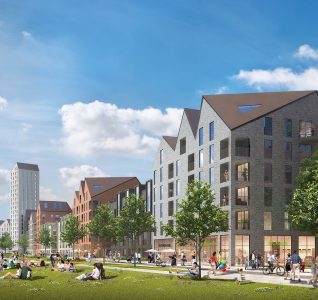- Despite the COVID-19 pandemic, the number of inbound Foreign Direct Investment (FDI) projects in the East Midlands fell by just one – from 39 in 2019 to 38 in 2020.
- The East Midlands outperformed the UK as a whole – the country recorded 975 FDI projects in 2020, down 12% on 2019’s 1,109 projects – helping the region achieve its record high share of the UK market.
- Transport and logistics was the East Midlands’ stand-out sector, with more than double the number of FDI projects in 2020 than 2019.
- The UK remains 2nd in the European league table for FDI projects – and closes the gap to leader, France.
East Midlands, MONDAY 7 JUNE 2021 – The East Midlands recorded a resilient year for inbound Foreign Direct Investment (FDI) in 2020, outperforming the overall UK and European outcomes and delivering a strong performance against the backdrop of the global pandemic, according to the EY 2021 UK Attractiveness Survey which launched today.
The region registered 38 overseas-backed projects in 2020, a decline of just one – 3% – from the 39 in 2019. By contrast, there was a 12% decline in UK projects and a 13% decline in the overall European market. This helped increase the region’s share of the UK FDI market from 3.5% to 3.9% – its highest share in the last decade.
The East Midlands’ positive performance was driven by gains in the transport and logistics sector, where the number of FDI projects more than doubled from six projects in 2019 to 15 projects in 2020.
Other key sectors for the East Midlands were agri-food with five projects (down from seven in 2019) and machinery & equipment with five (up from four). The UK’s leading sector, digital technology, accounted for just one project in the region.
Projects in the East Midlands were most likely to involve logistics activities (15 projects, up from nine), followed by manufacturing (nine projects, down from 11) and sales and services (seven projects, down from 13).
Out of all UK regions and constituent nations, the East Midlands recorded the eighth highest number of projects.
Nottingham and Northampton are the key locations for FDI in the East Midlands
Nottingham was the region’s leading city with 10 projects, significantly ahead of its decade average of four. The 2020 performance meant Nottingham was the UK location with the joint 12th highest number of projects (alongside Coventry and Peterborough).
The other East Midlands location in the UK’s ‘top 20’ was Northampton, ranked joint 15th with nine projects – again, significantly ahead of its decade average of three. Northampton and its surrounding areas benefitted from a pandemic-accelerated shift to online commerce and a need to boost capacity.
Simon O’Neill, Office Managing Partner at EY in the Midlands, said: “Against the backdrop of a global pandemic, the East Midlands delivered a positive year for FDI in 2020. The impact of both the pandemic and the UK’s departure from the EU can be seen in how some of the region’s key sectors have performed too, particularly the strong performance of the distribution sector and logistics activities. The region has adapted quickly to changing circumstances.
“With businesses more keenly focused on supply chains, the East Midlands is well positioned to attract investment in these areas in the next few years.
“According to our survey, the key criteria investors will consider when looking outside London are the availability of the skills of the local workforce, the strength of local business networks, and access to regional grants and incentives for investment and R&D. There are signs of a shift in attention beyond London with the share of investors who say it is the UK’s most attractive destination falling from 46% in 2019 to 25% in 2020.”
Eight per cent of investors surveyed by EY as part of the research said that the East Midlands was the most attractive UK region in which to invest, up from 5% in 2019.
Transport & Logistics in the UK
The UK transport and logistics sector – a key activity in the East Midlands – performed strongly in 2020, attracting 84 FDI projects – a 95% rise from 43 in 2019.
The UK’s share of the European market for projects in the sector more than doubled in 2020, rising to 13.7% from 6.5% in 2019. Only Germany (128) and France (89) attracted more transport and logistics projects.
Simon O’Neill commented: “The sector is an undoubted beneficiary of some of the shifts the UK economy has seen in the wake of the pandemic. Companies are looking carefully at their supply chains and the best way to get products to customers. As the UK moves towards a knowledge and online economy, the transport and logistics sector, and the businesses working within it, are likely to continue to perform well.
“Transport & Logistics may also have an increasing role to play in the levelling up agenda. Almost half of investors are looking to change their supply chains in future and a fifth are considering reshoring to the UK. With the manufacturing and logistics opportunities likely to fall outside of London and major cities, this may be a one-off opportunity to reshape the UK’s economic geography.”
UK records ‘resilient’ performance
The region’s strong performance is set against a backdrop of resilience for the UK’s attractiveness as an investment destination amid the COVID-19 pandemic, with the country ranking second in Europe for total inbound FDI projects in 2020 and expanding its share of the European FDI market.
While the UK again missed out on Europe’s top spot for FDI – for only the second year in the survey’s two-decade history – the gap was closed on 2019’s first-time leader France. In 2020, the UK secured 975 projects (down 12% from 2019’s 1,109 projects); France hosted 985 projects (down 18% from 2019’s 1,197 projects). Germany ranked third with 930 projects (down 4% from 2019’s 971). Spain remained a distant fourth with 354 projects (down 27% from 2019’s 486).
Overall, Europe saw a 13% fall in projects – from 6,412 in 2019 to 5,578 in 2020 – which helped the UK expand its market share of FDI for the second successive year, from 16.6% in 2018 and 17.3% in 2019, to 17.5% in 2020. Meanwhile, London reclaimed its status as Europe’s most attractive city for investment, overtaking Paris.
UK performance ‘positive’ but country ‘trails Europe’ on clean technology
Alison Kay, Managing Partner for Client Services at EY UK & Ireland, added: “Given the impact of the pandemic, a shrinking FDI market, and the then-uncertain future trading relationship with the EU, the UK delivered a positive FDI performance in 2020. A relatively small decline in project numbers meant the UK far-outpaced downbeat investor forecasts too. In our autumn 2020 survey of investment attitudes, investors forecast a 30% to 45% decline in UK projects compared to 2019.
“The UK has demonstrated resilience and adaptability in attracting investment. Key sectors have changed over time, and the UK attracted the most ‘new’ projects in Europe in 2020 rather than relying on reinvestments. However, its former dominance of the FDI market has been replaced by a competitive three-way tussle with Germany and France. To regain its place as the market leader, the UK will need to build on its strengths. The investors we spoke to for this year’s survey identified digital technology and health and wellbeing as being key growth areas for the UK, and these are areas where the country already excels.
“However, in increasingly vital areas, such as clean technology, the UK trails Europe. COP26 in Glasgow should provide some impetus to improve, while investors tell us they value green policy and regulatory certainty as well as support to develop green supply chains. There is an opportunity for holistic, targeted initiatives to attract FDI in the priority areas that should form the core of a ‘Building Back Better’ strategy: innovative research and digital technology; ‘cleantech’; and levelling-up the UK’s economy.”
Posted on 07 June 2021







